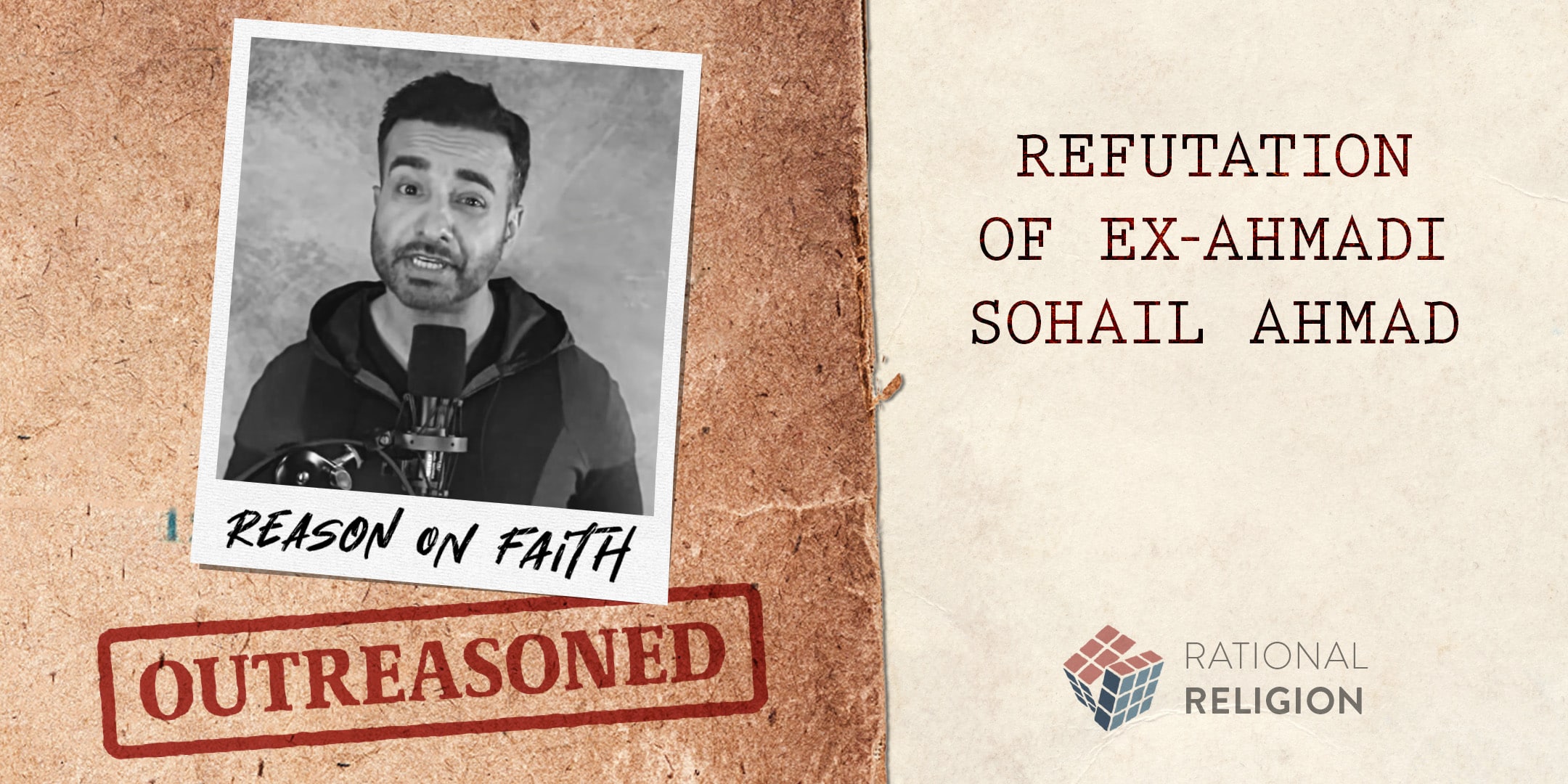Moses said, ‘And what hast thou to say, O Samiri?’ He said, ‘I perceived what they perceived not. I only partly received the impress of the Messenger, but that too I cast away. Thus it is that my mind commended to me.’
— Quran 20:96-97
…
Introduction
The growth of the internet has brought with it both benefits and harms. It has enabled wide dissemination of both information, as well as misinformation. The dividing line between the two is sometimes, for the unlearned, difficult to discern.
Sohail Ahmad is an ex-Ahmadi ex-Muslim, now technically an agnostic deist, with an anti-theist attitude, who goes by the moniker “Reason On Faith”. He seeks, in his own words, to “explore(s) topics of religion, faith, community and science, with reason as the lens”, bringing to bear a critique of Islam in general and the “Ahmadiyya denomination specifically”. He states that he “detests anti-Muslim bigotry” and that his criticisms come from a place of “love.” So far, so good.
Sohail’s profile has grown, especially since the launch of his YouTube channel, with his “coming-out” video as an ex-Ahmadi, ex-Muslim. He spends much of his video re-hashing twitter arguments he has had with myself (Tahir Nasser) or my brother Umar.
It was thus one fine winter morning, when I sat down and started to read Sohail’s principal thesis as to why he believed Islam in general, and Ahmadiyya Islam in particular, was a false creed, with too many logical contradictions to be considered to have proceeded from a rational being. His article, found here, is long, well-written, detailed, and aims to provide, as much as possible, a thoroughly good-go at disproving Islam Ahmadiyya.
I read through it all. I pondered. Then I read through it all again. This time, I jotted down every substantial point or argument I came across. I left out those arguments that are nothing more than supposition or opinion, and which have nothing to do with the central arguments against the truth or falsity of my faith. I then got to work researching Sohail’s claims and arguments.
What did I find?
Sadly, I found half-truths, untruths, ignorance of Islamic scripture, failure to follow simple logic, and emotional appeals wrapped in the garb of logical argument, riddled throughout every argument and almost every paragraph.
In response, we here at Rational Religion present fifteen articles in response to Sohail’s fifteen major arguments. They can be found under the tab “Refutations” in the tab at the top of this page. They cover the following topics:
- Does Islam Permit the Rape of Female Prisoners of War?
- Are Two Female Witnesses Equal to one Man in Islam?
- Does Islam Sanction Domestic Violence?
- Does the Quran Promote Dogmatism?
- When Should we Interpret Scripture Metaphorically?
- Did the Prophet Solomon (as) Talk to Ants?
- Faith, an Impossible Game?
- Do we need Double-Blinded Trials for Faith?
- Does Religious Practice Cause Cognitive Bias?
- Do Ahmadis not Know their own Theology?
- Claims of Misogyny in Ahmadiyya Leadership Refuted
- Is the Multiverse Islamic?
- Does Islam Teach Creationism?
- Homosexuality and the People of Lot
- Does the Quran Contain Recycled Myths?
Since Sohail completed his treatise of beliefs, his core arguments as to why he believes Islam Ahmadiyya is a factually false creed, he has produced other articles and other allegations. They may be dealt with in the future. The above however constitute the central tenets of his position, and as such, failure in these central tenets should be sufficient to demonstrate that other, subsidiary arguments he has subsequently made, are false too. At the end of each article, we present certain “Questions for Sohail” that he should consider.
The arguments were not, in all honesty, difficult to refute. For a person who claims to use “reason” as his modus operandi, I found his arguments riddled with fallacies. There was little to do in most cases other than analyse the premises and demonstrate their evident falsity.
In the section below, I present the principal logical fallacies and missteps Sohail advances for each of the articles outlined above. Reading them, you may wonder how anybody could be duped by them. But Sohail, though possessing a superficial understanding of Islam, is a good writer, adept at using language to hide what he wants and reveal what he wants. He is good at winning over the reader with a veneer of reasonability and rationality. As such, there are some Ahmadis who, reading his blog, have inclined to his views, finding his arguments persuasive. This betrays a serious lack of critical thinking on the part of such individuals, as well as a fundamental lack of understanding of the primary sources of Islam – the Quran, in particular. I invite them to read these articles and consider carefully the arguments put forward.
What strikes me most about Sohail’s writings is that on the one hand, this is clearly an intelligent individual, yet on the other, his arguments are so utterly lacking in logical consistency. What can one conclude from this? The only thing one can conclude is that he has contorted his faculty of reasoning to reach a predestined, pre-determined conclusion. He is unwilling to submit to a higher, objective authority, but rather expects and demands that higher authority to submit to his whimsical, environmentally-subjective moral standard, which also happens to entirely coincide with the western, liberal-Canadian milieu in which he was raised. Coincidence? I think not.
In the quote at the top of the article, Moses (as) confronts a man who had misled the children of Israel into worshipping an idol. When asked why he did so, Samiri states that he did not fully receive the impress of Moses’ (as) teaching and whatever was impressed upon him, was cast away, at the behest principally of what his mind bade him to do. In response, Moses (as) tells him that his punishment in life would be social ostracism: “…Go away. It shall be thine to say throughout thy life, ‘Touch me not;’…” It is a sad fact that Sohail has repeatedly and emphatically railed against the consequences of his leaving Ahmadiyya Islam, particularly from the perspective of losing the love of erstwhile friends and relatives. He has stated numerous times that he wished that leaving one’s faith did not carry such consequences.
This of course is sad, but in fact totally understandable. Indeed, if religion is truly taken seriously by any group of people, as the fulfilment of one’s life and the purpose of one’s existence, it is difficult to see how its renunciation by a member of a family, could not be taken as a serious and worrying event. And while no one should be persecuted, harassed, insulted, harangued or pestered because of a change in their private beliefs, it would be a strange thing for no-one to be worried, concerned and indeed, anxious, on behalf of those they love, who they feel have strayed off the right path, the path that leads to the fulfilment of their purpose in life. Sohail’s desire, stated throughout his website therefore, that leaving a religion should not result in repeated attempts by family and friends to convince one to return, is unrealistic. In fact, it would necessitate religion to no longer be a driving factor in people’s lives. What Sohail is therefore callling for, under the guise of mutual respect, is for religion to no longer play an active and serious part in the lives of people. That is his view and he is most certainly entitled to it.
If he wants to see his wish become reality however, he will have to advance better arguments than those he has.
Sohail Ahmad’s Errors of Reasoning
Does Islam Permit Rape of Female Prisoners of War?
Error #1: Ambiguity (misrepresentation)
Error #2: Ad-Hominem
I found this to be the most egregious example of deliberate misrepresentation in this entire slew of arguments.
In this criticism, Sohail misrepresents Hazrat Mirza Bashir Ahmad (ra) as claiming that Muslims were permitted to rape female prisoners of war as a form of retaliation against non-Muslims doing the same, by selectively quoting a passage, while omitting both its introductory statement and concluding statement, that would give the lie to his conclusion.
Are Two Female Witnesses Equal to One Man in Islam?
Error #1: Appeal to Emotion
Error #2: Personal Incredulity
Error #3: Strawman
This argument has one of the best lines in Sohail’s entire repertoire: “Knowing human nature, I submit that…” What qualifications he advances for “knowing human nature” is left entirely obscure to the reader.
In this section, Sohail appeals to emotion and cites his own personal incredulity (on the background of “knowing human nature”) as an argument against the Islamic injunction.
In the end, the main thrust of his argument however is that of a strawman. He makes out that Islam requires two women to testify in place of one man on account of their supposed intellectual deficiency. This is incorrect. He falls into this trap because he does not consider the social circumstances of male/female segregation in Islamic society, and also does not consider that the verse in question requires two men in the first instance to testify too.
Does Islam Sanction Domestic Violence?
Error #1: …Too many to count!
In this section, Sohail’s errors relate to appeal to emotion, jumping on the bandwagon, loading the question and black or white thinking.
Fundamentally however, in this section, Sohail fails to engage with the basic meaning of the text, by totally bypassing the meaning of nushooz. He ignores the fact that, far from giving men a license to hit their wives, this verse at best, gives them a license to act in self-defence against verbally, emotionally manipulative and physically violent spouses.
He goes on to ignore other quotes of the Quran that prove that Islam gives the lie to the idea that the wife is as a servant to the husband, and also fails to recognise where the Quran gives advice to women on how to deal with abusive husbands.
Does the Quran Promote Dogmatism?
Error #1: Strawman fallacy (twice)
In this section, Sohail misrepresents the Quran as not asking the reader to use their rationality to reach their conclusions.
Secondly, he misrepresents the position of the Quran and Islam vis-a-vis other religions, by claiming Islam teaches you to reject the warnings of punishment in those scriptures, making a person liable to punishment according to those faiths. This is a misrepresentation because it fails to recognise that Islam recognises the warnings of all religious scriptures as true, and as relating to the original forms of those faiths, which according to Islam, were a form of…Islam.
When Should we Interpret Metaphorically?
Error #1: No errors in this – just a genuine and important question that he asks! He does however demonstrate his lack of knowledge of Islamic scripture, by claiming that certain language has only been used in the Quran about Jesus (as) but not about Muhammad (saw). This is false.
Did Prophet Solomon (as) Talk to Ants?
Error #1: No rational fallacy – just factually and grammatically false!
In this argument Sohail simply demonstrates his lack of knowledge of Arabic grammar. No logical fallacy, just a lack of knowledge.
It is also worrying that Sohail cites Maulana Maududi approvingly, since Maududi was a fascist with very poor understanding of Islam.
Faith – An Impossible Game?
Error #1: Fallacy of “False Equivalence“
In this argument, Sohail uses the “Impossible Game” argument of Theramin Trees, to falsely equate Islam, and Ahmadiyya Islamic theology in particular, with those of other faiths, ignoring that the nature of the claims of Ahmadiyya Islam are singularly different, especially as regards the nature of obtaining certainty of faith in this life.
Do we Need Double-Blinded Trials for Faith?
Error #1: Logical fallacy of “False Premise”
Error #2: Lack of knowledge of Ahmadiyya history
In this argument, Sohail fails to recognise that Ahmadis would not ever place any value on a research study into prayer consisting of only Christian candidates. He uses this false premise as the basis of his argument that the Ahmadiyya leadership are too afraid to advocate for such a study.
His second error is in not realising that the Promised Messiah (as) himself advocated for an intercessional prayer study and was in fact probably one of the first in world history to describe a double-blinded, randomised controlled trial, in doing so!
Does Religious Practice Cause Cognitive Bias?
Error #1: Invincible Ignorance Fallacy
Error #2: Straw-man fallacy
Error #3: Logical fallacy of “False Equivalence”
As in other articles, Sohail fails to even engage with the nature of the evidence provided by Ahmadiyya theology. He goes on to categorise all Ahmadiyya claims as inherently subjective in nature and then advances a straw-man argument (ironically!) on that basis relating to cognitive bias. Finally, he draws a false equivalence between personal goals and divinely-determined purpose.
Do Ahmadis not Know Their own Theology?
Error #1: Anecdotal + Ad Hominem + Black or White
Three fallacies in one!
Firstly, he asserts that his observation is that Ahmadis don’t know their own theology because they haven’t read the commentaries of the Quran. Ironically, if Sohail had read half the commentaries he claims he has, he would not have made many of the errors he has. Regardless, the argument is purely anecdotal.
Secondly, the argument he advances is a fundamentally ad hominem one. He seeks to dismiss the lived religious experience of Ahmadis by claiming that they are ignorant of their faith because (according to his anecdotal observation) they have not studied it sufficiently.
Thirdly, he employs the “black or white” fallacy, which involves presenting the reader with two options, when in fact there are many more. This is the fundamental error he makes in this regard. In effect, he asserts that either Ahmadis have read about their theology and therefore adhere to their faith with eyes wide open, or, they have not read sufficiently the arguments in Jama’at literature, and thus blindly adhere to it. I highlight that many other options exist whereby an individual may recognise the truth of a faith without necessarily having read large volumes of commentaries and texts.
Claims of Misogyny in Ahmadiyya Leadership Refuted
Error #1: Strawman + Ad Hominem
Error #2: The Texas Sharpshooter
In this heavily emotionally loaded section, Sohail advances multiple arguments, based on misquoting, misrepresentation, half-truths and un-truths about positions taken by the Promised Messiah (as), the 4th Khalifa (rh) and the current head of the Ahmadiyya Muslim Community (aba). His primary technique is therefore to advance a strawman argument in an attempt to push an Ad-Hominem. In the end, he appeals to the emotion of the reader, while cherry picking quotes (Texas Sharpshooter) to paint a false picture.
Is the Multiverse Islamic?
Error #1: Ambiguity
Sohail either deliberately or unknowingly, through the fallacy of ambiguity, misrepresents both what the multiverse is and what the Promised Messiah (as) wrote about the topic of multiple universes.
Does Islam Teach Creationism?
Error #1: No fallacy, just failure to read.
In this argument, Sohail argues for an interpretation of a Quranic verse that contradicts the very words of the Quranic verse itself.
Homosexuality and the People of Lot
Error #1: False Premise(s)
In this section, Sohail uses false premises to make his point. He asks why, if there is a cure for homosexuality, God hasn’t revealed it and if there isn’t, why would God punish it? He goes on to describe (erroneously) God’s actions as genocide and (wrongly) asserts that Islam mandates gay individuals to heterosexually marry.
His first error is in portraying the Islamic position on homosexuality as that of a literal disease, with a literal cure, rather than as a sin, as other sins are described in the Quran. There is no literal (medicinal) “cure” for any other sin, then why would homosexuality be any different? His second error is in arguing that homosexuality is an immutable trait. His third error is in falsely categorising God as a human actor. And his fourth error is in falsely characterising Islamic teachings.
Does the Quran Contain Recycled Myths?
Error #1: False Premise
Error #2: Strawman
In this section, Sohail gangs up with the Masked Arab, it seems, to firstly advance a false premise argument, that any verse of the Quran was revealed in response to demands by non-Muslims, refuted amply by multiple verses of the Quran itself. Secondly, Sohail uses a strawman of misrepresenting the Quranic chapter of Al-Kahf to have not imparted any information or knowledge relevant to the subject matter under discussion in the chapter, namely, the development of Christianity into a polytheistic creed.
…
On his website, linked above, Sohail writes that he has a tendency to “always … align myself with that which is true, and not just with that which is useful (or merely convenient)”. We applaud his verbal commitment to the truth, but we do wonder whether it has any meaning. Would anyone say differently about themselves? Regardless, we look forward to welcoming him back to Ahmadiyya Islam once he realises the falsity of his many criticisms, as detailed in the pages above.











5
Thoroughly enjoyed this rebuttal.
Give me a question and I will give you a book!
Well done.
4.5
Really disappointed by the rebuttal. Justifying the unjustifiable. Epitome of mental acrobatics.